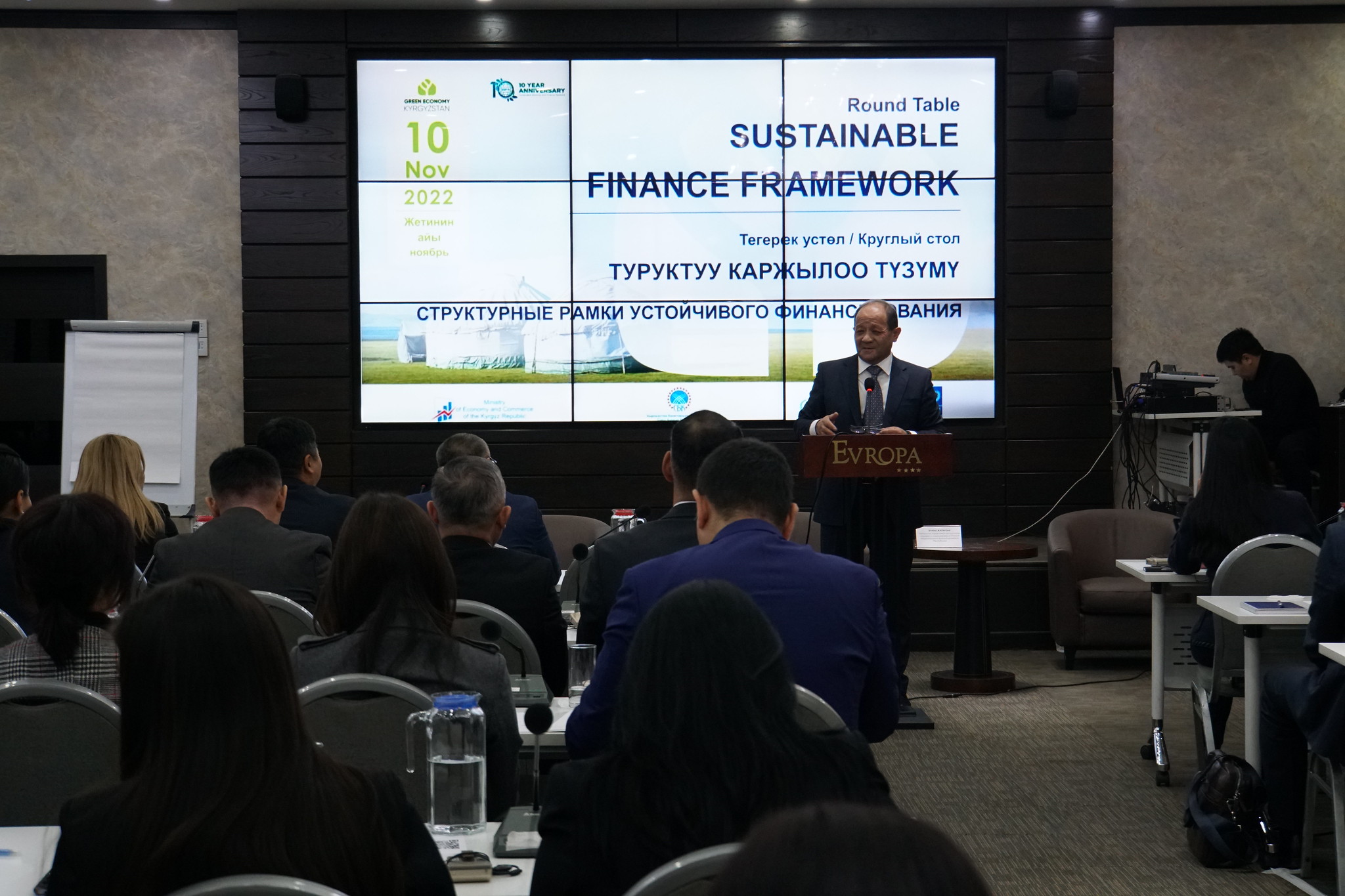UNDP Looks to Enhance Sustainable Finance in the Kyrgyz Republic
November 10, 2022

10 November 2022, Bishkek – UNDP and the Union of Banks organized a platform to discuss sustainable finance in the Kyrgyz Republic as the next stage to bolster its transition to low carbon, resource-efficient, sustainable economy.
The workshop aimed to gather representatives from the private banking sectors of Georgia, Kazakhstan, and Mongolia to exchange ideas with colleagues from the Kyrgyz Republic and to discuss ways to enhance sustainable finance to meet the 2030 Agenda and Paris Agreement goals. The discussions were also focused on the Sustainable Finance Roadmap. Representatives from Georgia, Kazakhstan, and Mongolia shared their experiences and paths. These countries are leading the integration of environmental, social, and governance issues into financial decision-making and risk management processes in the financial sector.
Sustainable finance involves raising funds to address climate and environmental issues on the one hand and improving financial risk management on the other. In turn, sustainable finance considers environmental, social, and governance issues. This pattern is expected to increase long-term investment in sustainable economic activities and projects.
“Now finance looks for investments with no climate risks, and the financial institutions are required to report on environmental, social, and governance performance. The transition towards sustainable banking and finance practices effectively requires an enabling environment national green finance framework that is in line with international practices that provides the right economic incentives to support and invest in green nature and climate-related projects. The Sustainable Finance Road Map will lead us to development of the green finance framework”, noted Chingiz Makeshov, Deputy Minister of Economy and Commerce of the Kyrgyz Republic.
Sustainable finance contributes to achieving carbon reductions and transitioning to a low-carbon economy. As part of the implementation of Nationally Determined Contributions (NDCs), by 2030, Kyrgyzstan has committed to reducing emissions by 15.97% through domestic resources and by 43.62% with international support. According to the statement of the President of the Kyrgyz Republic at the Conference of Parties (COP) in Glasgow, the Kyrgyz Republic will strive to reach the platform of carbon-free green development by 2050 with international support.
“As we witness from the experience of other countries, examples of sustainable finance range from green mutual funds, where you invest in companies that provide environmentally friendly products and services, to green credit cards that give users extra rewards for every dollar they spend on sustainable activities. Green finance is broad-spectrum. This may include but is not limited to, climate finance. It can also refer to other divergent environmental goals, such as industrial pollution control, water sanitation, or biodiversity protection,”- said Anvar Abdraev, the President of the Union of Banks of the Kyrgyz Republic.
While sharing Kazakhstan’s experience, Aigul Kusalieva, Manager of the Green Finance Center, underlined that legislative harmonization of green finance provides the basis for responsible investment in Kazakhstan.
Salome Tvalodze, Head of Macro Financial Modeling and Analysis Division, National Bank of Georgia, highlighted the importance of capacity-building activities and explained how the sustainable finance taxonomy framework works in Georgia and detailed guidelines on its implementation.
According to Azamat Usubaliev, UNDP Team Leader of Sustainable Inclusive Economic Growth, the dramatic effects of climate change and environmental degradation showed the need for a more sustainable economy on the agenda. Transforming the economies of many developing countries, including Kyrgyzstan, to become more sustainable requires large-scale investments to ensure the transition to a low-carbon economy, given that the public sector alone is often unable to meet this financial need.
Solutions have been found in many countries to involve the private sector. Transitioning to a green economy is an opportunity to mobilize sustainability and social equity. It is a pathway towards achieving the 2030 Sustainable Development Agenda, working towards eradicating poverty while safeguarding the ecological thresholds which underpin human health, well-being, and development. Partnerships and initiatives are essential drivers of change to replicate success and scale up a green economy effort. It is necessary to unite societies and communities, businesses, financial institutions, and government organizations to collaborate and drive the transition to a green economy.
Today’s workshop was a part of UNDP activities under Partnership Actions for Green Economy (PAGE)/ Participation was open to all interested parties looking for best practices. The results of today’s workshop and more details on Kyrgyzstan’s Sustainable Road Map will be shared tomorrow during the Green Economy Forum. We welcome all stakeholders to join us for the presentation of results , including business, the financial sector, public policy, civil society, academia, and others, whether you are new to natural capital and green economy approaches or whether you are experienced and want to share your work.
***
UNDP partners with people at all levels of society to help build nations that can withstand crisis, and drive and sustain the kind of growth that improves the quality of life for everyone. On the ground in more than 170 countries and territories, we offer global perspective and local insight to help empower lives and build resilient nations. Under the Partnership for Action on Green Economy (PAGE), UNDP puts sustainability at the heart of economic policymaking. PAGE brings together the expertise of five UN agencies: UNEP, ILO, UNDP, UNIDO and UNITAR. Together they support nations and regions in transforming economies into drivers of sustainability and social equity, by providing policy advice, assessments, capacity development and analytical tools outputs to 22 partner countries, including Kyrgyzstan. PAGE has been supporting the country in its commitment to advance inclusive sustainable growth, embedded into its long-term National Development Strategy 2040 since 2016. PAGE is also working with the government on sectoral reforms in green industry, sustainable agriculture and jobs and strengthening institutional capacities around inclusive green economy diagnostics, coordination, finance and public procurement.

 Locations
Locations







